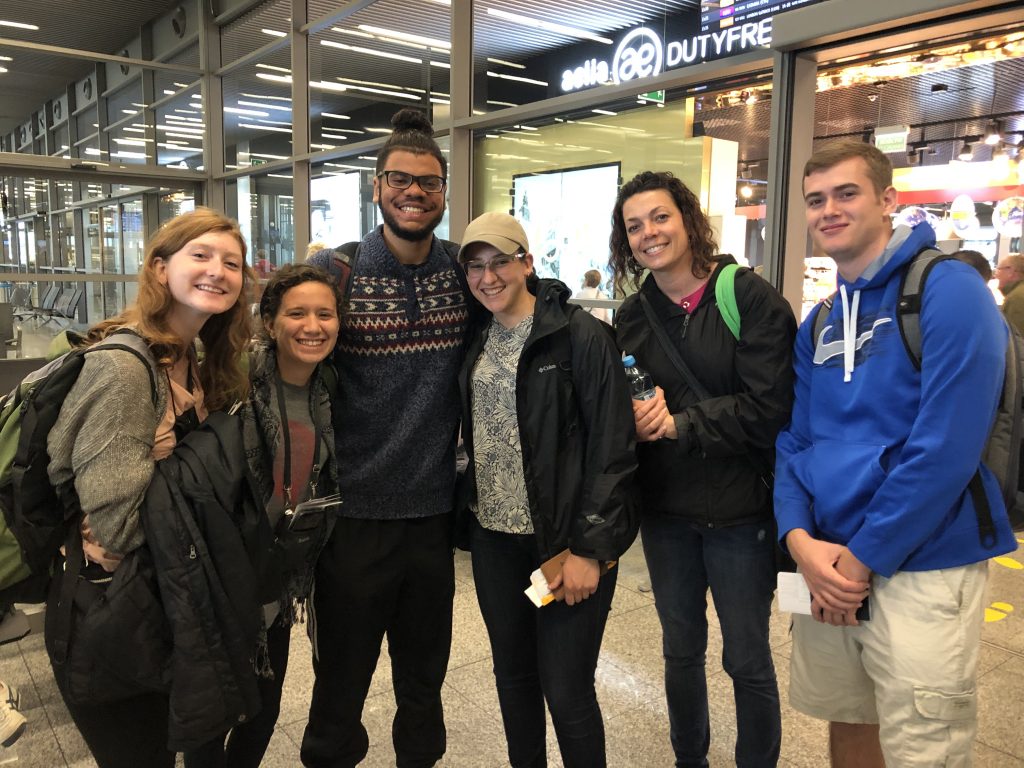The Holocaust had a great impact on the international community and how the law and its punishments are carried out. Terms such as ‘genocide’ and ‘crimes against humanity’ were not used or cited until the Nuremberg Trials that followed World War II. The fact that these terms did not exist in the legal arena while the crimes were being committed made trial and conviction difficult. Many major war criminals, such as high ranking officers in the Nazi regime and Nazi judges under the Third Reich, had their sentences commuted or dropped only a few years into their life sentences. The International War Tribunal (the court established to conduct the trials in Nuremberg) had is legitimacy questioned throughout the trials given that it was established by the allies, was predominantly carried out by the United States, yet tried German criminals in Germany. My work was focused on collecting resources and artifacts that encompass these issues and highlight how international law was impacted by the crimes and atrocities of the Holocaust.
Jul 03
Treblinka: From Hope to Despair
Final Paper
Embedded in the functions of running an extermination camp, the Nazis made concerted attempts at deceiving their victims, thereby minimizing their resistance to deportation. Victims were led to believe that conditions “in the East” would be better than those they left behind in the ghetto. Even Jews who had heard rumors of the camps had difficulty believing what the Germans were doing there. Every decision and action the Nazis took was calculated to ensure that their true intentions were not revealed while they reaped the benefits of their forced slave labor before systematically eliminating them. From where they set up their death camps, to burning the bodies of the victims, the Nazis took concerted steps to minimize both the evidence they left behind and who bore witness to their atrocities. Treblinka itself is highlighted by absence: an absence of infrastructure, an absence of testimonies, and an absence of interest. In my paper I analyzed how the construction of Treblinka’s operating system around hope and deception was used in order to maximize the efficiency in the liquidation of Jews.
Jun 28
Sexual Violence and the Brothels

Jun 01
Digesting the pieces…
What can I say about the last few weeks? Actually, quite a lot. My best thoughts always come after I’ve spent time in solitude to digest the pieces then put them together into a whole, sort of like a jigsaw puzzle. I ask myself all of time why I chose to study the Holocaust. After all, I’ve only been a serious scholar of the Shoah for less than 2 years. Just as there are many different pieces of a whole, there are many different reasons I took this path that are both professional and deeply personal. Hardly a moment went by anywhere we went in Poland that I didn’t know I was in the right place, and I was there for the right reasons. Mission accomplished!
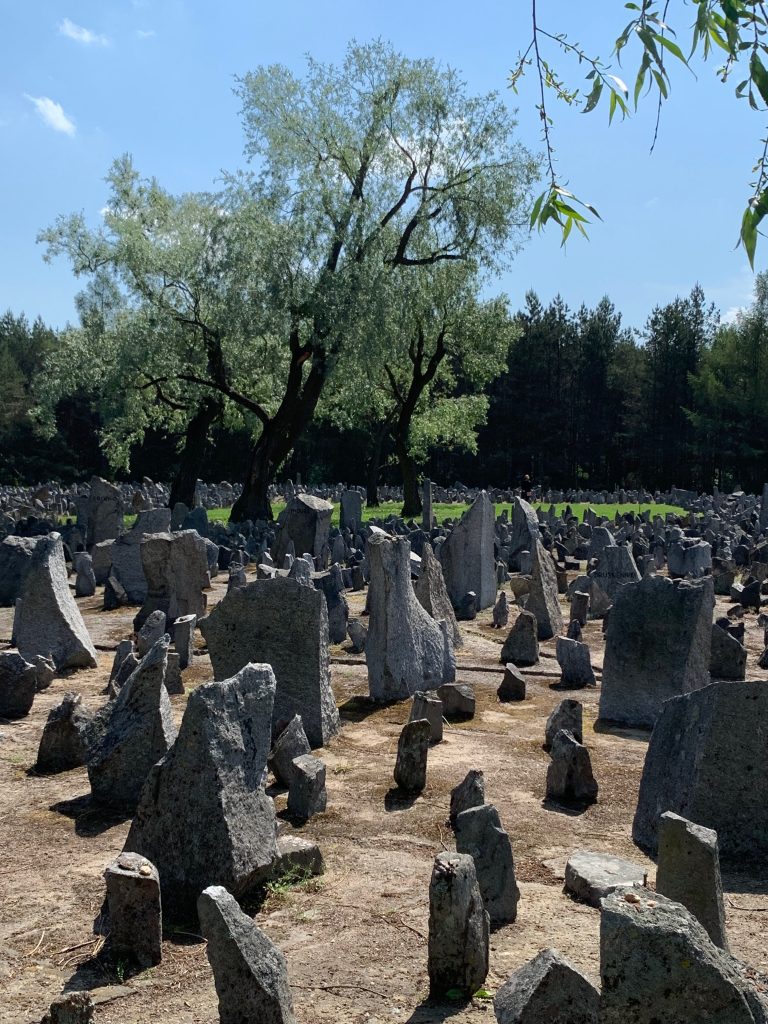
We had so little time together before the trip, I fretted that students might come back home without understanding it is nearly impossible to comprehend the history of the Shoah without invoking geography. Well, I worried for nothing. Judging from their many questions, observations, interactions, discussions, reflections, etc. while we were in Poland, all of them were ‘practicing geography’. So, congratulations to the historians, they are now honorable geographers.
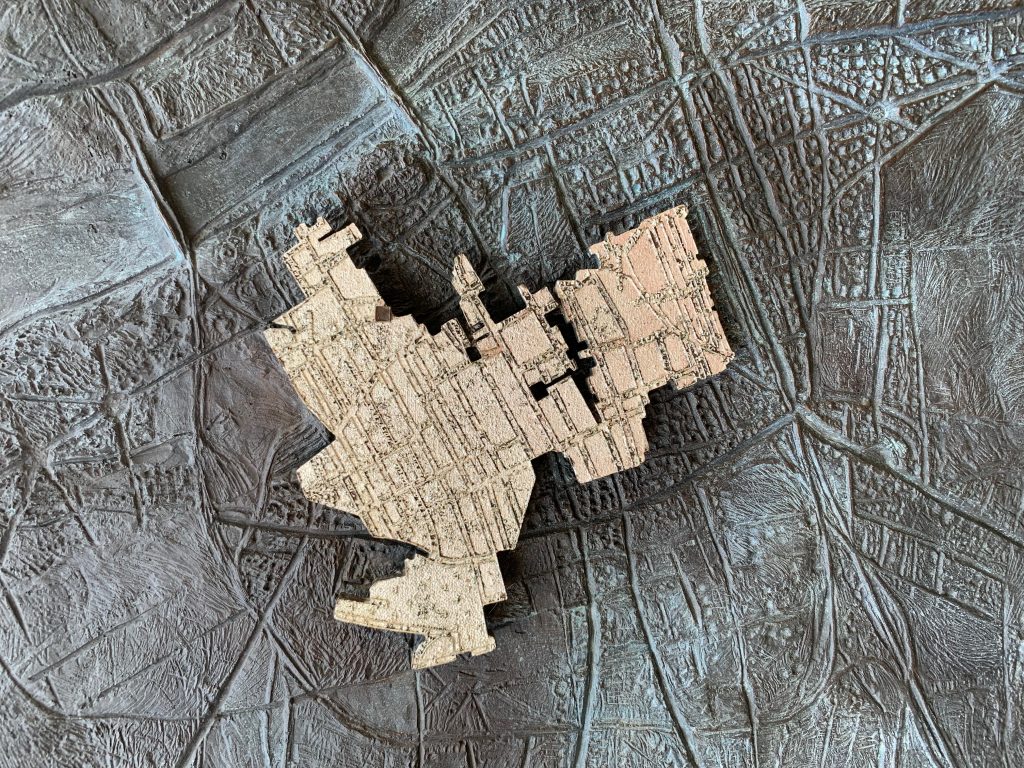
I also learned much from the group…..For example, did you know Alex can eat an entire Zapiekanka all by herself? Impressive. Dan knows his Bison grass Polish vodkas, Logan can sleep upside down on a bus, and Kelly studies the perogies on her plate like a rabbinical student studying the Torah (very seriously). All valuable life skills. Elena also has admirable detective skills finding something on the menu that didn’t include meat or dairy (a real challenge in Poland). Kaerra hates the camera almost as much as the camera hates him, and don’t ever serve cold apple pie in Melonie’s presence. Last but certainly not least, Dr. Finley missed her calling as a boot camp trainer (my legs fell off somewhere near Lodz).
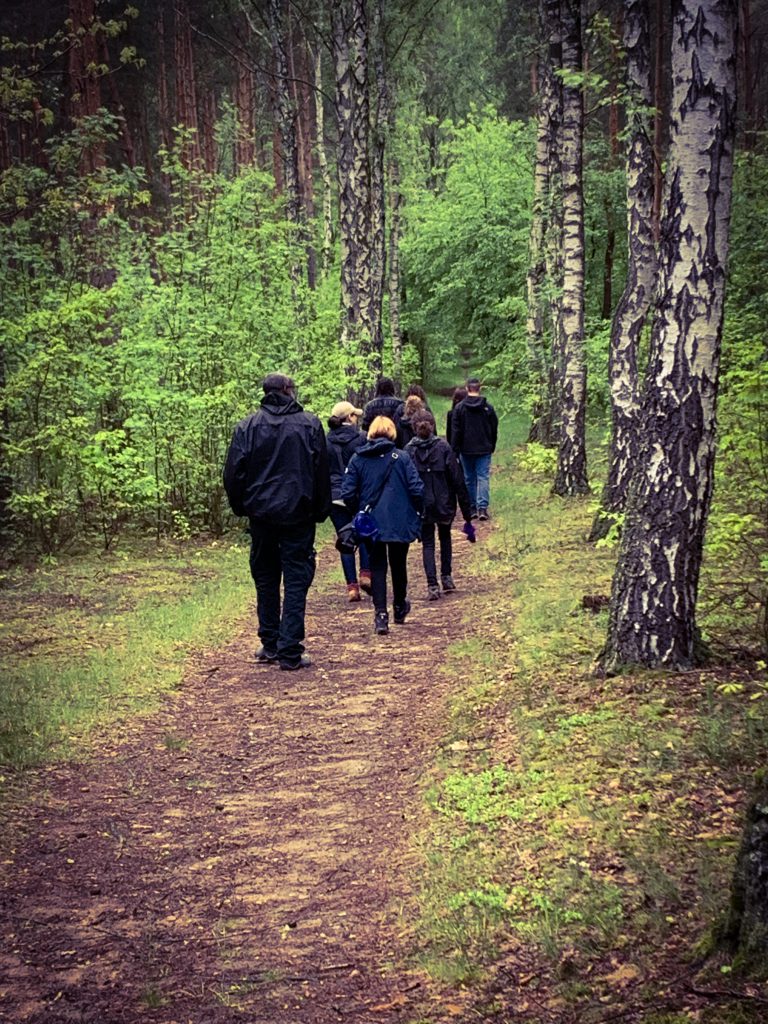
Jun 01
Reflecting with Responsibility
Prior to this trip, I had no idea what to expect, what I would encounter, and what the landscape of the Holocaust even looked like. What I have learned in my classes and my own reading can not compare to being in the field working with experts on the subject of the Holocaust. I am very thankful to both Dr. Finley and Dr. Chapman who have curated an amazing team in-country, using their networks to connect their students with first-class guides, scholars, and researchers.
What I have learned and experienced on this trip, I realize, is invaluable. There are not so many opportunities for people who are interested to learn about the Holocaust to do it in such a well-rounded manner. We saw both highly tourist-ed sites and sites in various stages of neglect. We saw how modernization has wiped clean impactful traces of the Holocaust and in other cases, contributed to its conservation and integration into the collective memory. We were given the opportunity to connect with witnesses of the Holocaust, and observed Polish life and culture as we made our way across the country.
What now? What do I do with everything I’ve seen, everything I’m holding inside me… I’m looking forward to starting our paper as a way of dissecting my experiences here, because since coming home I just haven’t stopped moving. I think that because of the pace of the trip and my pace of life since coming home, I still haven’t had a chance to really let everything sink in. One lesson I’ve taken away from this trip is the importance of personal responsibility.
Each man is questioned by life; and he can only answer to life by answering for his own life; to life he can only respond by being responsible.
This quote by Viktor Frankl has taken on new meaning for me. I know that my personal responsibility is to live in service to others, using interdisciplinary means to deal with the changing tides of politics and the effect it has on the human experience. It is impossible not to feel anger when witnessing human suffering in any form. Turning this anger into action by understanding ones moral and ethical responsibilities means to aid those who suffer from hunger, poverty, lack of education, poor access to resources, and all forms of discrimination. All I hope that what anyone can take away from this trip is that they are obliged to carry on the truth they’ve seen, and are responsible for positively impacted their world in light of the darkness they have witnessed is possible.
הִנְנִ֥י שְׁלָחֵֽנִי
May 31
Post-trip reflection
Since coming home a week ago from Poland, (I can’t believe it’s already been a week!) I’ve had a moment to readjust to the time and weather.. (I definitely could go back to the cooler weather over this hot, sticky mess). Going on this study abroad trip, I didn’t know what to expect, except that this trip was going to be a once-in-a-lifetime opportunity. I went in with the mind set that this was going to be a humbling experience… and it was truly, all of the above.
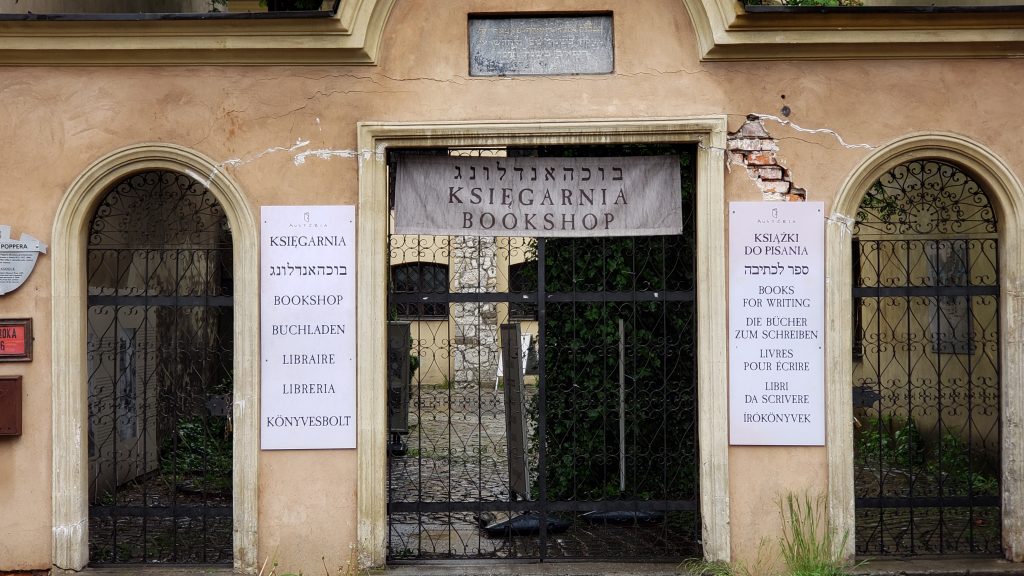
I haven’t fully proceeded or decompressed all of the valuable information that was explained to us, or shown to us from our guides, each day on the trip. As it says in other blog posts, “we may have been exhausted, but we never complained. We are not Princeton” and that was the truth!!! We absorbed as much information as possible and knew each moment was going to be an unbelievable experience. Even if our feet ached, and our legs cramped, our backs throbbed, or we felt like we just had fallen asleep.Yeah, I had a few bumps in the road, along the trip with my suitcase wheels busting off. A disintegrating umbrella and a pair of shoes that also leaked, as Dr. Finley’s did too. That being said, I think each one of us would do it all over again to relive each one of those unbelievable moments.
May 30
Post-Trip Reflection
It has been less than a week since our group returned to the US, and I have not stopped thinking about everything we experienced. All study abroad trips, regardless of topic, provide students with unique learning environments. However, especially while studying the Holocaust, these unique learning environments surpass any lesson that can be taught in a classroom. I have read countless articles and books, watched numerous films, and taken several classes on the Holocaust, but nothing compares to standing on site where victims and perpetrators of the Holocaust once stood. To be in the field is to be thrust into the past. After covering over 80 miles on foot (thanks @Melonie’s FitBit), and spending late nights on course preparation for the next day, I was completely exhausted by the end. But our group never complained. We knew that each opportunity we were getting was a once in the lifetime experience, and we were eager to learn as much as we possibly could.
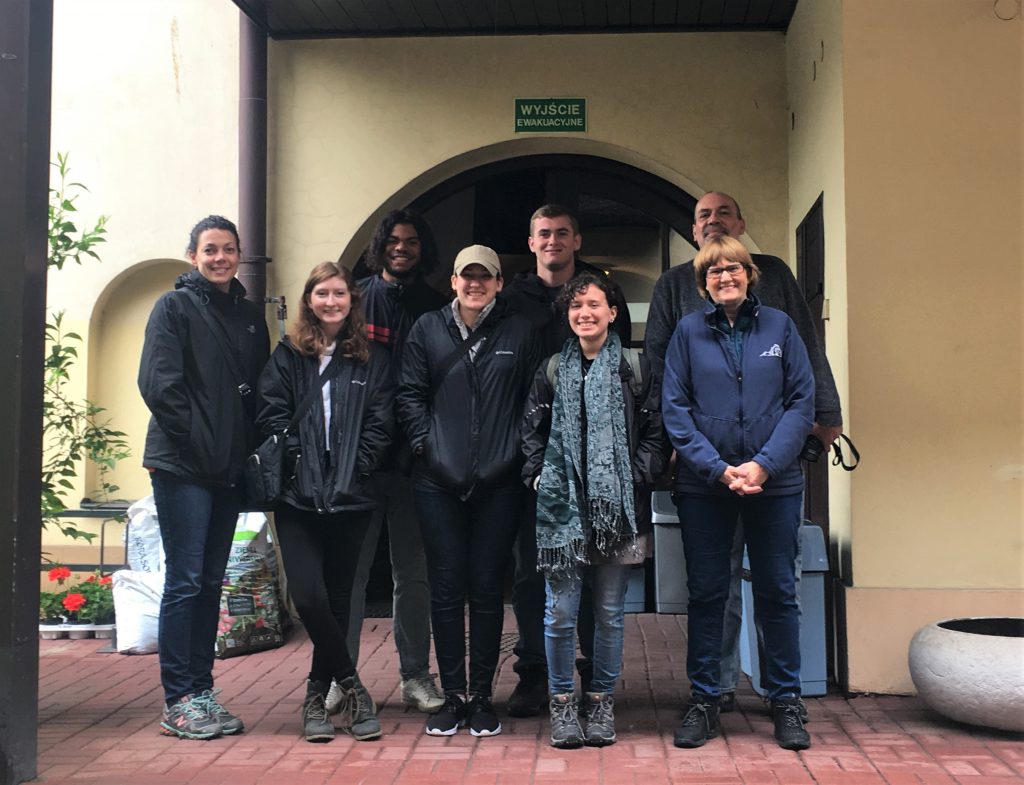
There are still moments that I have not yet fully processed, but as with everything surrounding the Holocaust, there will always be a sense of incompleteness in my understanding. There were so many powerful moments throughout the trip it is hard to sit here and try to reflect on everything. Getting to work with the team from Yahad In Unum is still, by far, the most impactful experience I have ever had. Hearing the story of a witness’ mother hiding two Jewish men under their kitchen floor boards, and getting to see the cellar itself was surreal. I was able to climb down into the cellar where I, a 5′ 6″ woman, was crouched down with my back against the ceiling. To imagine two grown men sharing this space for hours, or days on end was just crazy to me. This is a moment I will not soon forget, and one I will continue to examine for years to come. It is another example of how diverse the memory of the Holocaust can be, and how important it is to track down and record the memories of witnesses and survivors
May 27
Thank you….
Many thanks to those who worked with us in Poland on an amazing study abroad. The list is quite extensive…all gave amazing presentations/tours/conversations/insights/relfections. THANK YOU! Annette Finley-Croswhite, Ph.D. and Tom Chapman, Ph.D.
Krzysztof Suszkiewicz, Plaszów; Dr. Edyta Gawron, Jagellonin Unviersity, Kraków; Maciek Zabierowski, Learning and Special Projects, Auschwitz Jewish Center, Kraków, Oświęcim; Paweł Sawicki, Press Office, Auschwitz-Birkenau, Oświęcim; Dr. Agnieszka Haska, IFiS, Polish Academy of Sciences, Warsaw; Dr. William Glass, Professor of American social history at the American Studies Center of the University of Warsaw; Michał Chojak, Deputy Director of the Research Center Yahad-in Unum–for our work in Piotrkow Trybunalski and Tomazow Mazowiecki; Hubert Buczak (investigator), Yahad-in Unum; Renata Masna (interviewer/interpreter), Yahad-in Unum. And the amazing NINA KROLL, our interpreter in Warsaw, Łódź, Piotrkow Trybunalski, and Tomazow Mazowiecki!
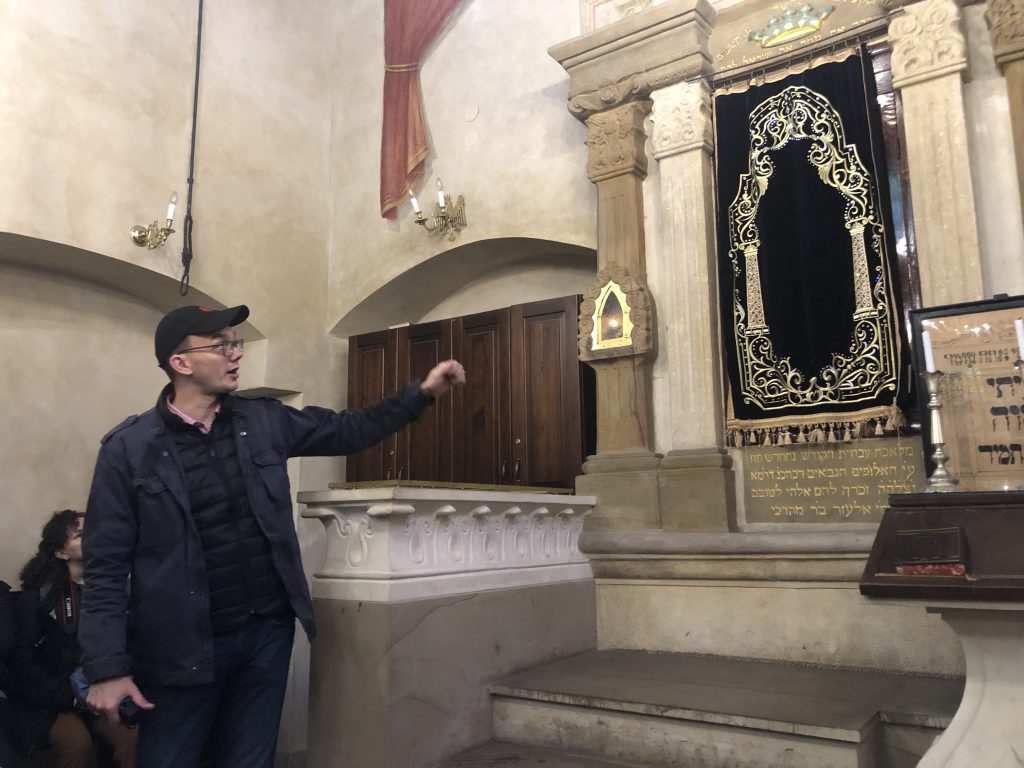
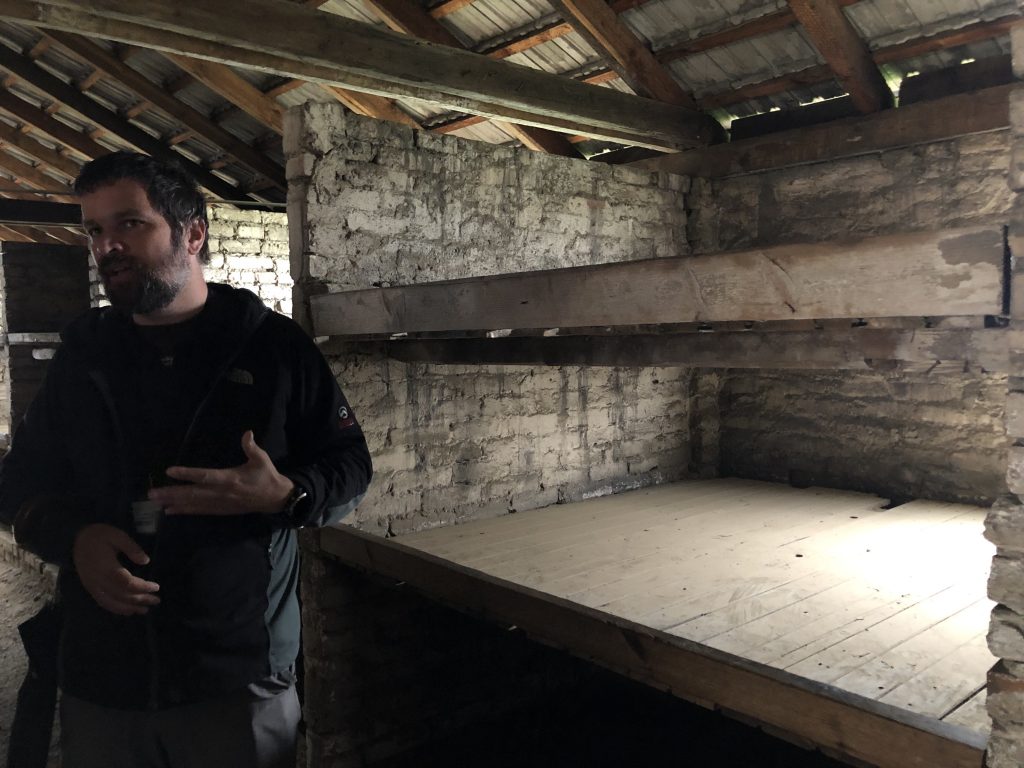
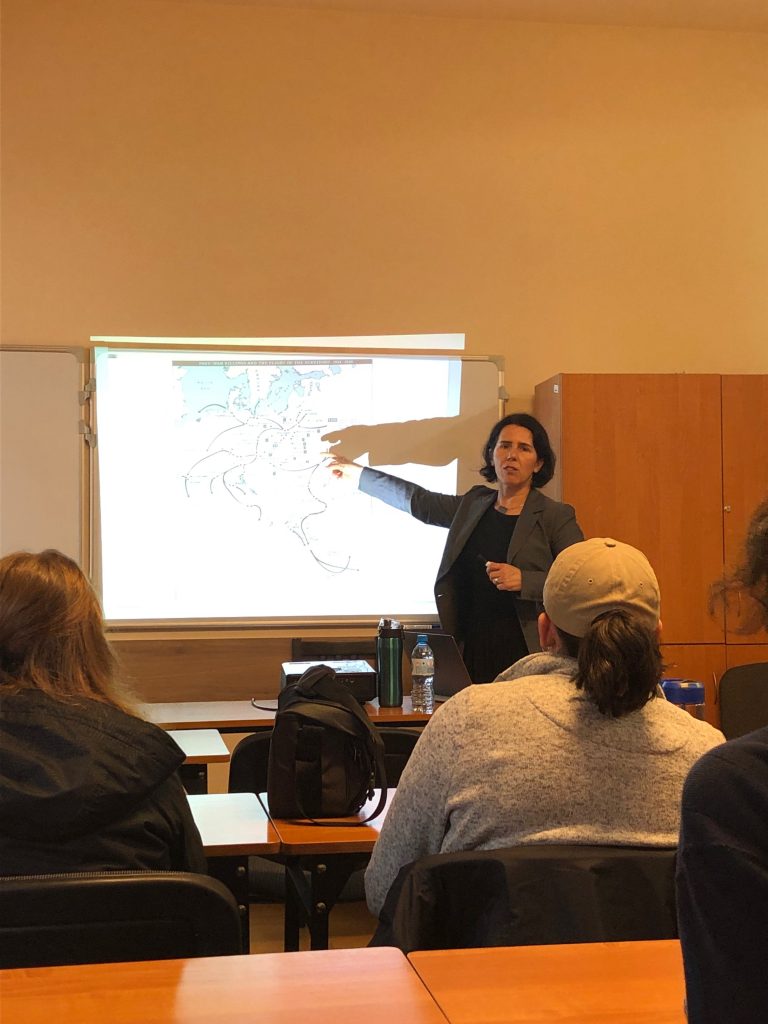
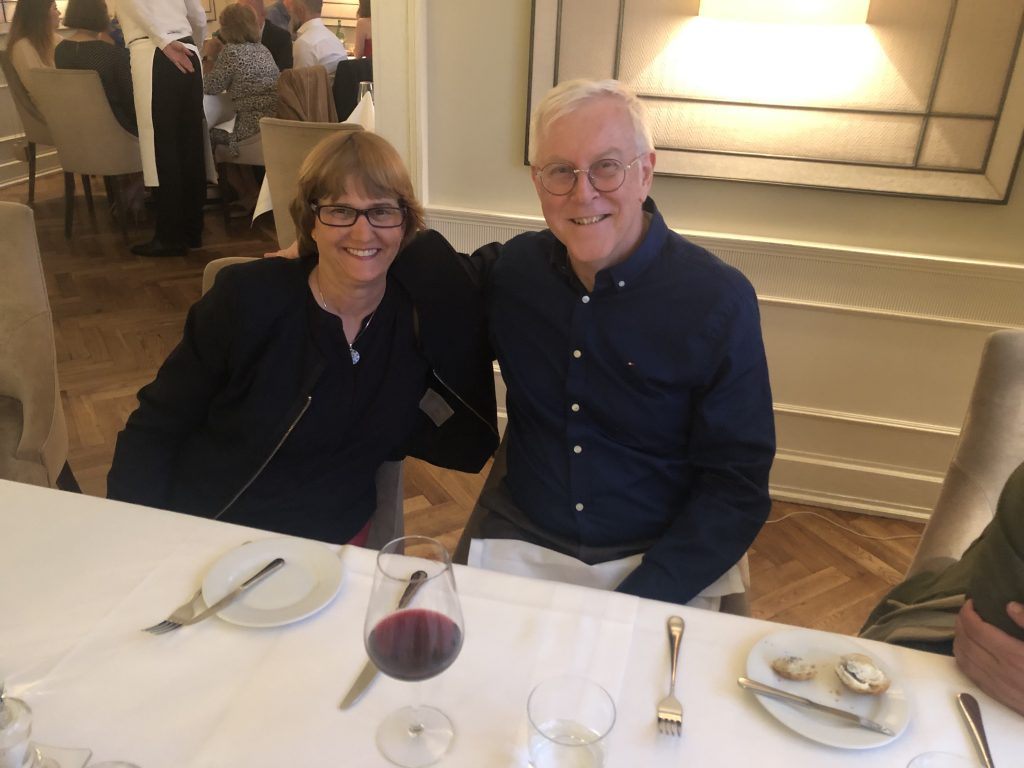
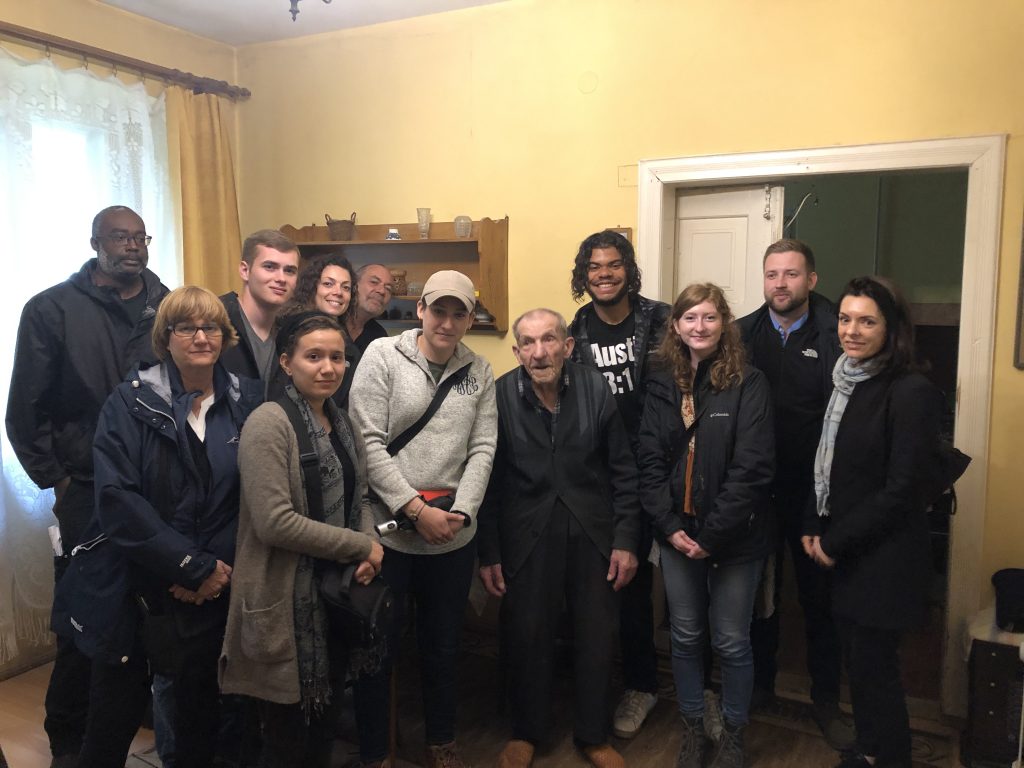
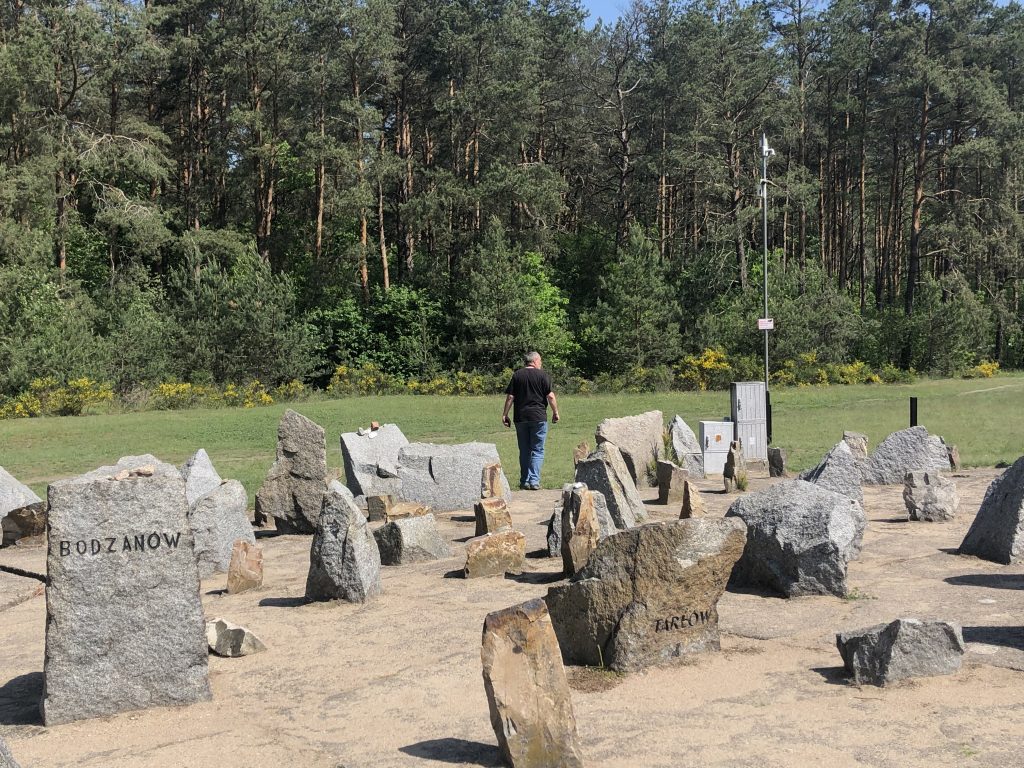
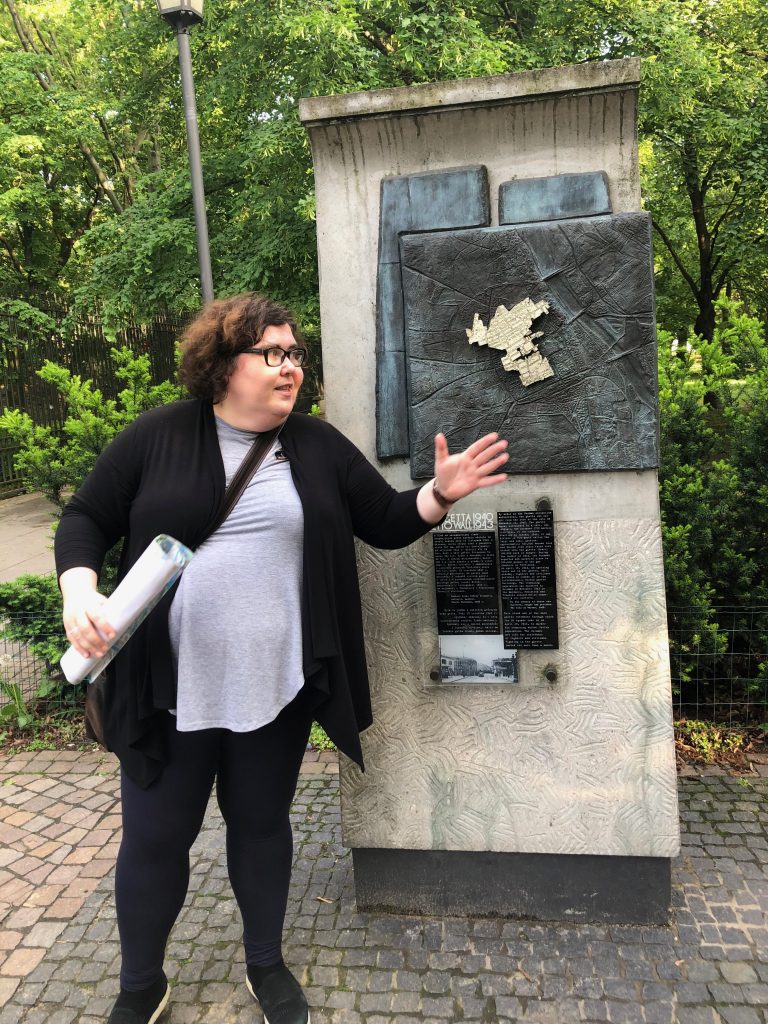
May 27
Projecting Empathy in the World; believing in the human race.
I’m not sure why I trek half way across the world taking students to sites of atrocity. Many people tell me that they don’t know how I do it. My response, is: how could I not? I was born Christian, the daughter of a Protestant minister, and it was devout Christians who in many instances participated in the Holocaust as perpetrators and bystanders. Doesn’t the long history of religious violence tell us that we have to be very careful where religion in involved. The great irony is that religions can promote both love and hate. Many Germans, in fact, praised Martin Luther’s anti-Jewish writings to promote their own antisemitism during the Holocaust and justify their horrific actions. Not that’s a history lesson.
I was thinking yesterday, I’ve done this trek six times now, when do I stop? To this point the students often can’t keep up with me so physically I think I’m doing just fine. I do have the ability (and always have according to my mother) to exist without much sleep…but I don’t advise trying this at home! Pushing oneself in foreign climes strikes me as an important experience for students. (One of my students told me the study abroad trip was good practice for OCS training in the Marines! Now that one made me proud)! In hindsight there is so much to teach from a historical point of view amplified in the last two versions of this course with a focus on human geography. But beyond the history and geography lessons, perhaps the most important outcome of a class like this is to teach empathy. The Nazis didn’t attack world Jewry all at once…anti-Judaism and antisemitism were intensified over time. When we let down our guard today, when we accept rudeness, incivility, and cruelty as a matter of course, we all take one giant step towards the dehumanization of those around us. That step is just too dangerous…doesn’t the Holocaust teach us that?
For some reason I’m still struck by the man who passed us outside of Piotrkow Trybunalski while visiting a small Holocaust memorial after we met the witness Stanissalaw S. who saw Jews killed when he was a boy. The man parked his car and walked up to Renata Mansa who was with us to say he had driven by the memorial all his life but for some reason when he saw us that day he felt the need to stop and pray for the victims. He was young, probably only 35 or so, but collective memory has a way of touching many generations. The fact that he would see our class and feel compelled to confront the history of his town was powerful to me. Had we trekked to Poland for this? And I’ll never forget Elena singing the Mourner’s Kaddish at two execution sites. I reflected on that in an earlier blog post, and I thank Elena Simon for her willingness to say Kaddish for the victims; it could not have been easy. I had the overwhelming sense that the victims had been waiting for her, for us, to arrive. If that was a mitzvah, it included all of us as participants (Elena) and observers (our class and guides).
I hope in the days to come my students will reflect on their own actions in the context of what we have learned. All of us, all humans, single out others for ostracism. We note difference…it is human nature. Some of us may be more evolved and more aware of prejudice, racism, and antisemitism in our environments and we may fight it already. Maybe that isn’t the case for all; I am always learning when it comes to confronting hatred. This course should make the participants bolder in standing up for social justice, for what is right, for refusing to be a bystander when people are singled out for their color, religion, ethnic background, linguistic heritage, personal disability, sexual orientation or for the multiple reasons that humans try to divide instead of unite. The onslaught against the Jews in the 1930s didn’t begin over night. It was a long process of selective discrimination that in the end had murderous consequences. But all of us see difference, and sometimes in my own life I’ve found this course has helped me to forgive others who have hurt me, even when it was very, very difficult. I have tried to be less angry with situations and employ more empathy even when it is hard. The course has helped me to stand up for others. Building walls of separation do no good for the human story. Father Patrick Desbois says in “Holocaust by Bullets” “believing in the human race is a serious responsibility and a position that needs to be consciously created and constructed (p. 68).” Those are some of the most powerful words I have ever read, and I quote them to my students and my sons all the time. I state them here so that readers can contemplate them in the context of their own lives.
Pictured below is Stanisslaw S., a witness to atrocity and introduced to us by our colleagues at Yahad-In Unum. We also see the marvelous interpreter, Renata Masna, who taught us all a lesson in oral history interview methods. She was marvelous.
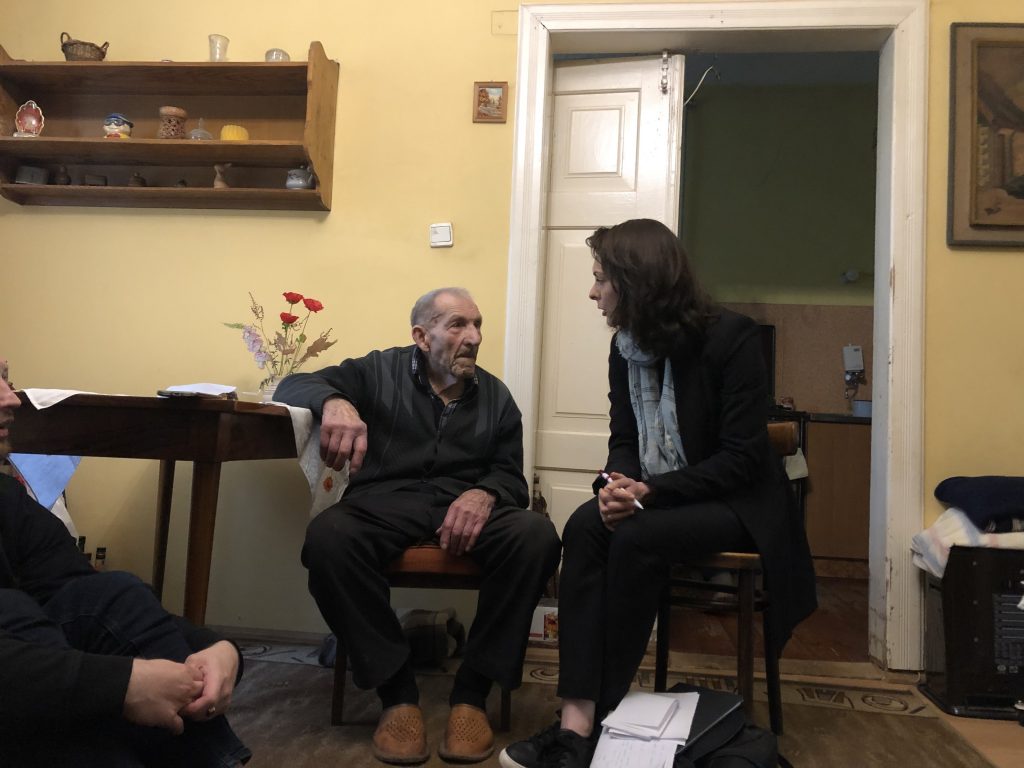
May 25
We made it home!
Yesterday is a blur. 6:30 am hotel departure, 10:40 am flight from Krakow to Munich; 12:20 pm flight from Munich to Washington, D.C. Dulles; 515 pm flight from Washington to Norfolk. Below is our last picture, minus Kaerra Smiley who left a few hours before we did for a flight to Guam and Dr. Chapman who stayed on a few extra days in Krakow. This was by far the most extensive study abroad trip I’ve ever done…years of planning, really, an evolution of sorts. And it was also the most exhausting. I really didn’t realize how much it took out of the students physically and emotionally until some conversations on the plane ride home. I always push myself through the fatigue and foot pain, and I’ve been such a traveler all my life, I think I forget sometimes how difficult travel can be. I’m always in the “teacher-zone.” But Alex, Logan, Melonie, Kelly, Dan, Elena, Kaerra (Smiley) are amazing students and for different reasons, I’m proud of each and every one of them. Thank you for taking this voyage with me and Dr. Chapman. May the memory of this course remain with you always as a lesson in human responsibility. You were brilliant!
